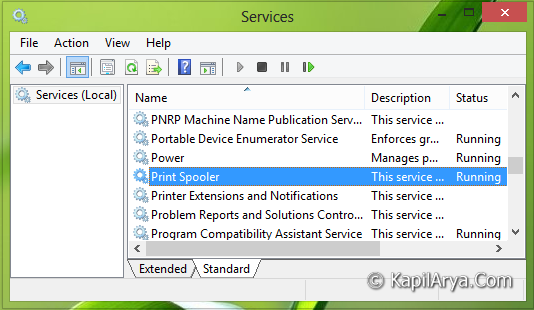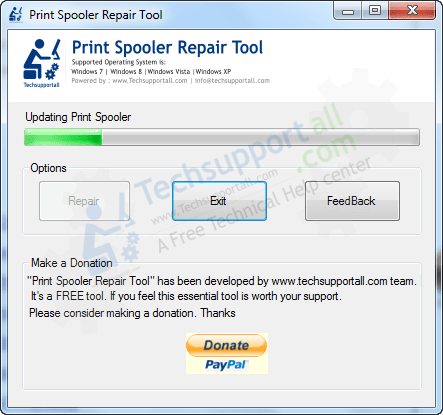Start Printer Spooler Service Vista
On a Vista PC, the printer spooler keeps crashing. Tried quite a few different things, uninstalling printer drivers etc and the entries in the registry but it still keeps crashing.
I can go in and start it but when I go to the Printers menu to try and add a printer or look at the Server Properties I just get an error saying that the Print Spool Service is not runng as it has crashed again. Installed SP1 but no joy either and there is no old System Restore points to try restoring it to. Any idea's what I can try? That's not what I asked (nor, actually, do I really understand the answer in any case). How big is the C: partition.
In gigabytes? And how much of those gigabytes are free (unused). That number also stated in gigabytes. For example, if it's a 250 GB drive; and if 15 GB is devoted to the recovery partition (usually Drive D:), then that would, theoretically, mean that Drive C: should be 250 - 15 = 235 GB; and of that 235 GB, Windows and all programs and data will use-up a bunch, leaving a certain number of gigabytes (let's say, just for example's sake, 130GB) free. (Your actual numbers would be different, of course.) So, then.
Print Spooler Keeps stopping Automatically. Vista) Click on Start and then Type Services.msc in S. That time you get crashed your printer spooler service.).
I need to know the size (in gigabytes) of Drive C.and then I also need to know how many of those gigabytes on Drive C: are free and open and not currently being used. The reason I ask is because the print spooler uses those free gigabytes. And variably adjusts itself larger and smaller, using-up available free disk space, dynamically, as it needs it while it's printing; and then it releases it after printing is done. If the disk space that the spooler normally requires is just too small for it to do its job, then it can crash. Or if the disk space used by the spooler got corrupted at some point along the way, and so the spooler gets a little confused whenever it temporarily expands large enough to where it needs said disk space, then it can crash. I'm not saying that that's the problem.
- Double-click on Print Spooler, and click on the Stop button followed by the Start button. 8 Observe the status column in the Services window to verify that the print spooler is stopped or started as applicable.
- Use the scroll bar on the right side of the window to find the 'Print Spooler' options. Click on 'Start the Service' to turn on the printer spooler and allow printing to begin again.

But only a fool woudn't want to make sure that that's not it as part of troubleshooting. What's the size of the C: partition; and how much of it is free (as in 'unused' or 'available')? By freeing-up more disk space on Drive C: Probably lots more.
See, the thing is, that darned spooler is a disk hog. I've seen graphical manipulation programs (like PhotoShop, for example, just to name one. Or maybe PaintShop Pro. Whatever) go to print a. Let's say it's a photo file that, as it sits on the hard drive, is only 2 MB in physical size; and because of its compression, opens-up to maybe 6 MB is RAM whenever it's open in a graphical viewing or manipulation program.
I've seen programs go to print 2 physical MB files (6 MB uncompressed and opened) and take-up a gigabyte or more of spooler space when printing. So, therefore, my point is, you'd be amazed.
Seriously, seriously amazed. Frazer software. How much darned space that spooler can require. I once printed-out a 280-page (not even 20MB in physical size on the disk) Microsoft Publisher document on a machine with 28 GB of free space on Drive C. And for however long it took to print out, Windows Explorer temporarily showed something like 2 GB free. Then as soon as the print job finished, all 28 GB of free space showed back up again in Windows Explorer. So that's the only reason I brought it up.
I'm not saying that this is what's wrong. If I had a gun to my head, I might suggest that it's probably something else. But I'm just saying that it's something worth looking. What the heck.
Just in case. I forgot to pursue the 'freeing-up' part.
Make sure that Drive C: isn't full of music or video files. They can be huge. If it's a notebook that's as new as only 2007, it might have a little 160 GB hard drive. Which, I don't know about you, but the free space on which (after Vista itself and all other program and data files)I can fill-up with downloaded movies and MP3 music files in a single weekend if I try hard enough! On such machines, there's nothing like a good external, USB-connected drive onto which all those music and/or movie (or they could be big graphic files, if he's into that) can be moved/archived so that primary disk space on C: can be recovered.
Or, if he's like me, he's got.WAY. too many programs installed. I love to try out stuff. Mostly open-source and freeware. Which means that there's no incentive for me to remove them after I've installed them because they never time-out. I've go so many programs installed on one of my Vista notebooks that I had to triple the size of the icon cache so that Vista could properly display and handle all the desktop and start menu icons.
It's ridiculous! And it's nobody's fault but mine. I'll bet if I uninstalled everything that I've tried and fiddled with for a while just to see how it worked, but then never looked at again, I could free-up 50 GB or more on that notebook's 250GB drive!
That's the sort of thing you have to do to free-up disk space. Figure out what you don't need and remove it; and then figure out what it would be okay to keep on an external drive and then archive it.
There are other reasons why free hard dirve space disappears so fast in Vista, too. But there's no point in discussing any of those until one first makes sure that one is being the best possible steward that one can be with whatever free disk space there is on Drive C: by just making sure to archive as much data stuff off onto external drives as possible; and only installing programs which one will actually use.
Also, keeping-up with temporary files and folders, and routinely deleting them off the hard drive; and also letting a utility routinely prune the registry. Those are important too. For example, though I consider it to be kind of a lightweight utility in its class, the venerable 'CCleaner' is a worthwhile thing to use a time or two or three per month. In my case, I've seen CCleaner, between its regular 'Cleaner' function, and its 'Registry' function, clear 300 MB from my hard drive. That's a third of a gigabyte, right there! Duplicate files is another disk space waster.
It's really easy to accumulate a lot of dupes. Especially if one is into versioning. And this is an often-overlooked one: Do you (or does your friend) empty his recycle bin once in a while? (And CCleaner can be configured to include that. But I never let it just in case I might need something I've put there. I always empty the recycle bin manually.
But that's just me) I have a client who didn't empty her recycle bin. And she does graphic stuff on her machine. Which means she deals in big files. She had something like 60 GB of stuff in her recycle bin. It was unbelievable! It can really accumulate if one's not careful. Here's a Google search that might help.
You wrote: 'I think I seen Limewire on it so could be full of stuff.' And we have a winner! Just a guess.
But, if so, then someone's probably been downloading music and/or movies. Each movie tends to be 700MB. That's two thirds of a gigabyte.
How Do You Start Printer Spooler Service
And MP3s can be various sizes, depending on their bit depth. Some of them 1, 2 or 3 MB in size, per song. If they're direct-ripped from a CD, and not simultaneously converted to MP3, then they're still in.WAV format. Which is maybe ten times larger, per song, than high-grade MP3s. And, same with movies: If they're ripped from a DVD, but not simultaneously converted/compressed to smaller file formats of the type usually downloadable via the bit torrent system (which, like I said, tends to be maybe 700MB per movie, give or take), then said DVD rips are quite likely to be from 4 to 8 GB in physical size on the hard drive. Do ten of those and you've eaten-up 40 to 80 GB.

Which is one half of a 160 GB drive C. Which is all the bigger most laptops came with as recently as a couple years ago (larger 250GB and 320GB. And now even 500GB drives were not common in laptops as recently as 2007 like theyare now). Again, disk space may not be it. Probably isn't. But it's sure worth eliminating, just to be thorough.
And don't let my having brought it up distract you from pursuing what other posters here have written about. Follow all leads.